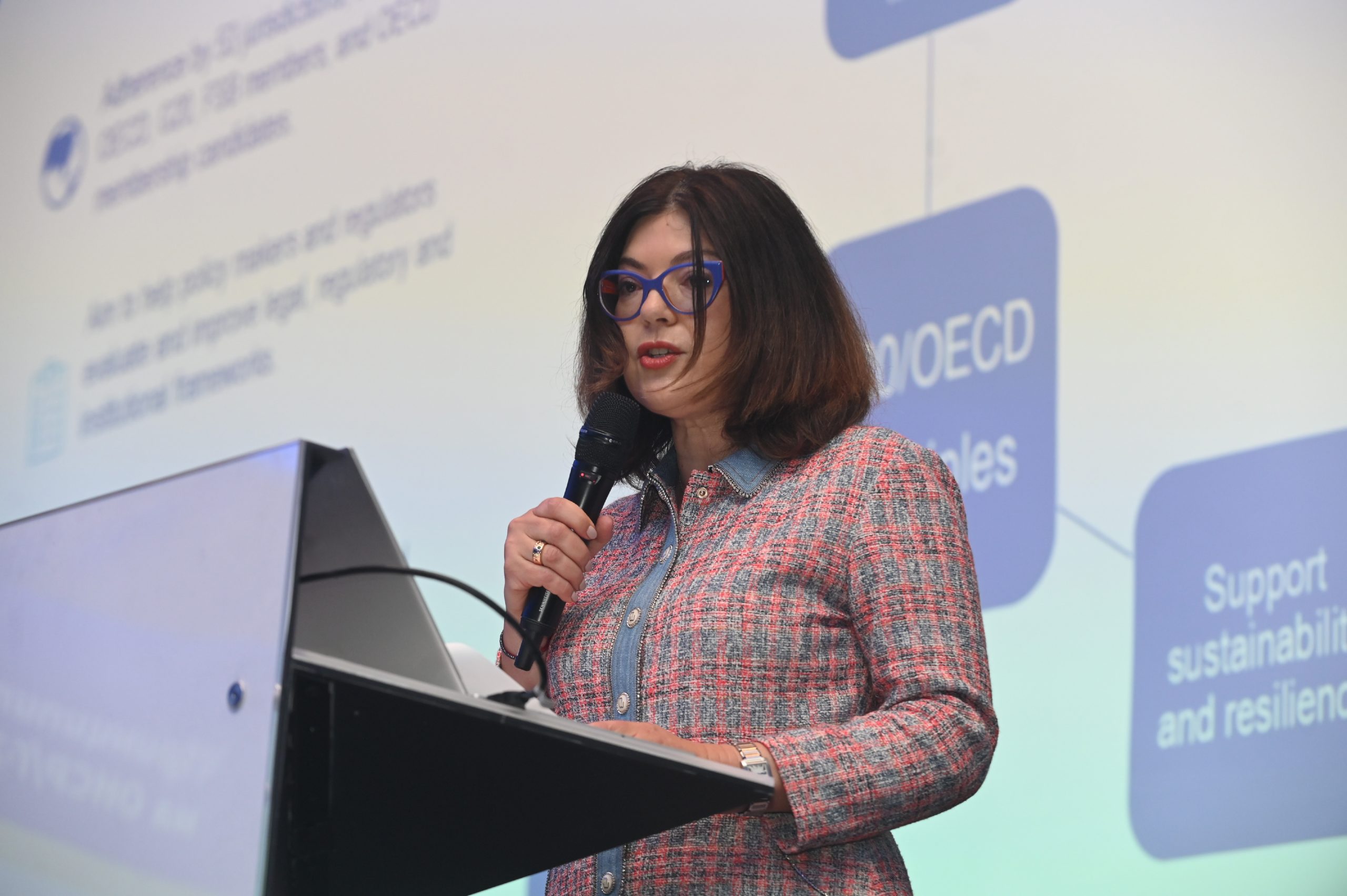The Financial Supervision Commission (FSC) has been notified by the competent authority of Liechtenstein of the merger from the insurance undertaking “Allianz Risk Transfer AG” to “Allianz Global Corporate & Specialty SE”, including insurance contracts on which Bulgaria is a Member State where the risk is located. After reviewing the portfolio documents, the FSC decided to send a letter to the national competent authority of Liechtenstein on granting consent of the merger of “Allianz Risk Transfer AG” to “Allianz Global Corporate & Specialty SE”
FSC Advocates for the Interests of the Bulgarian Market in the Debate on EU Capital Market Integration and Competitiveness
Vasil Golemanski, Chair of the Financial Supervision Commission (FSC), participated in the meeting of the Board of Supervisors of the European Securities and Markets Authority (ESMA), the independent EU authority playing a central role in the supervision of financial markets across the European Union.
A key focus of the discussions was the Market Integration and Supervision Package and its contribution to advancing the Savings and Investment Union, strengthening the competitiveness of EU capital markets and reducing regulatory burden. Board members also examined forthcoming legislative and regulatory amendments, including measures related to listing rules, market transparency, post-trade infrastructure and supervisory convergence.
During the debate, Mr Golemanski underlined the importance of ensuring that ambition is matched by operational feasibility:
“Deeper integration is essential if we want European savings to be channelled more effectively into investments that remain and generate value within the European Union, while reinforcing the EU’s position as an attractive and predictable place to do business. At the same time, proportionality must remain a guiding principle. Reforms should be sufficiently ambitious, yet workable in day-to-day supervisory practice, without creating unnecessary operational friction or new fault lines between markets.”
The FSC remains committed to ensuring that the Bulgarian non-banking financial sector is kept well informed of European regulatory developments and that the interests of the Bulgarian capital market are consistently and effectively represented in key supervisory discussions and decision-making processes at EU level.

The FSC Publishes Answers to the Most Frequently Asked Questions on Crypto-Assets
The Financial Supervision Commission (FSC) has published answers to the most frequently asked questions on crypto-assets, related to the Regulation on Markets in Crypto-Assets (MiCA) and the national legal framework under the Markets in Crypto-Assets Act.
The initiative aims to support companies that intend to apply for authorisation as crypto-asset service providers, as well as other interested stakeholders, by facilitating the interpretation and practical application of the new regulatory requirements.
The Frequently Asked Questions (FAQ) cover the main types of crypto-asset services subject to licensing, the specific features of the individual activities, the classification of service providers, and the conditions for application. Particular attention is given to the requirements concerning the business plan, organisational structure, governance arrangements, staff, and internal rules and procedures, as well as to the assessment of actual presence and operational activity in the Republic of Bulgaria.
The document also provides information on the transitional regime applicable to entities entered in the register pursuant to § 5(3) of the Transitional and Final Provisions of the Markets in Crypto-Assets Act, including the licensing deadlines, and the consequences following the end of the transitional period, including the supervisory authority’s expectations regarding the orderly winding-down of activities where authorization has not been obtained.
By publishing the questions and answers, the FSC seeks to enhance the transparency and predictability of its supervisory practice, support the timely preparation of market participants, and promote the responsible and sustainable development of the crypto-asset market in Bulgaria, in line with the European standards for investor protection and financial stability.
Everything you need to know about crypto-assets is available here.
List of entities which are not authorized by FSC
You can find the list of the non-licensed Investment intermediaries in the attached file – 07.01.2026
FSC and FID – SANS carried out jointly a training regarding the measures against ML/FT and the proliferation of weapons for mass destruction.
On 1st October, 2025 the Financial Supervision Commission and the Financial Intelligence Directorate of State Agency for National Security conducted a training focused on topics related to the implementation of the AML/CFT/CPF measures provided for in the Law on Measures Against Money Laundering (LMML), the Law on Measures Against the Financing of Terrorism and the Proliferation of Weapons for Mass Destruction and the acts on their implementation, organized for representatives of the investment intermediaries, management companies and alternative investment fund managers. The event was in hybrid form and was attended by more than 100 representatives of the obliged entities under Art. 4, items 8 – 10 of the LMML.
In the course of the meeting were discussed the following topics:
- goAML registration;
- Changes in the AML/CFT/CPF legislation;
- Implementation of the AML/CFT measures in practice.
The conducted training aimed to deepen the understanding of the representatives of the investment intermediaries, management companies and alternative investment fund managers regarding the requirements of the preventive legislation and their essential role in the process of maintaining the stability of the financial sector and in assisting to the competent state authorities in preventing and detecting money laundering and terrorist financing and proliferation of weapons for mass destruction activities.
The Financial Supervision Commission has sent notification about its consent for the portfolio transfer from “GENERALI ESPAÑA, SOCIEDAD ANÓNIMA DE SEGUROS Y REASEGUROS” to “GENERALI SEGUROS Y REASEGUROS, S.A.”
The Financial Supervision Commission (FSC) has been notified by the competent authority of Spain of the merger from the insurance undertaking “GENERALI ESPAÑA, SOCIEDAD ANÓNIMA DE SEGUROS Y REASEGUROS” to “GENERALI SEGUROS Y REASEGUROS, S.A.”, including insurance contracts on which Bulgaria is a Member State where the risk is located. After reviewing the portfolio documents, the FSC decided to send a letter to the national competent authority of Spain on granting consent of the merger of “GENERALI ESPAÑA, SOCIEDAD ANÓNIMA DE SEGUROS Y REASEGUROS” to “GENERALI SEGUROS Y REASEGUROS, S.A.”
The Financial Supervision Commission has sent notification about its consent for the portfolio transfer from “MSIG Insurance Europe AG” to “MS Amlin Insurance SE”
The Financial Supervision Commission (FSC) has been notified by the competent authority of Germany of the merger from the insurance undertaking “MSIG Insurance Europe AG” to “MS Amlin Insurance SE”, including insurance contracts on which Bulgaria is a Member State where the risk is located. After reviewing the portfolio documents, the FSC decided to send a letter to the national competent authority of Germany on granting consent of the merger of “MSIG Insurance Europe AG” to “MS Amlin Insurance SE”.
The Financial Supervision Commission held a conference on: “OECD/G20 Principles of Corporate Governance – Good Practices for Sustainable Growth”
On the 11 of June, the Financial Supervision Commission (FSC/Commission), in partnership with the National Corporate Governance Committee (NCGC), organized and held a conference dedicated to “OECD/G20 Principles of Corporate Governance – Good Practices for Sustainable Growth.” The forum featured the exchange of experience and best practices relying on the corporate governance principles, ESG and governance, mechanisms for sustainable development of the insurance sector, and incentives for corporate engagement in capital pension schemes.
The event took place in Sofia and brought together the leadership of the Commission, supervised entities, amongst which public companies, investment intermediaries, insurance companies, and pension insurance companies, institutional partners, business representatives, the state, consultants, and media, all of them motivated by the purpose to discuss the role and importance of the corporate governance and sustainable development, as well as the challenges related to them.
The conference was opened by the Chairman of the FSC, Mr. Vasil Golemanski, who emphasized the importance of corporate governance as a key factor for investor confidence, financial market stability, and the promotion of long-term economic growth. He noted that over the past years, corporate governance has been amongst the leading priorities in the work process of the authority and the Bulgarian business, as well:
“In addition to fulfilling its role as a supervisory and regulatory body, the FSC also aims to actively support business pursuing the goal of creating sustainable and steadily developing markets.”
Mr. Golemanski pointed out that the Commission actively participates in the European Supervisory Authorities’ activity and represents the state in plenty of international organizations acting in the non-banking financial sector. He also stressed the role played by the regulatory authority in the process of the forthcoming accession to the Eurozone and drew the attention of the audience to the FSC contribution made in the process of the achievement of the national strategic goal, namely Bulgaria’s membership in the Organisation for Economic Co-operation and Development (OECD). In this regard, he emphasized the successful cooperation between the FSC and the OECD Corporate Governance Committee in developing and implementing the updated Principles of Corporate Governance, which were officially adopted in 2023:
“We made significant efforts, together with the Bulgarian Stock Exchange (BSE) and the National Corporate Governance Committee (NCGC) to integrate these principles into the new Code of Good Corporate Governance, adopted by the FSC on June 5 this year,” noted Mr. Golemanski, adding that the FSC will persistently work for the voluntary observance of the Code by supervised entities.
“We are convinced that good corporate governance is the foundation for building trust between investors and issuers and for the stable growth of the capital market. We believe that a significant number of issuers will comply with these principles not only because the FSC recommends them, but because they realize their role in creating a sustainable and transparent market,” he added.
Ms. Fianna Jurdant, Senior Policy Analyst at the OECD, also addressed the participants. She presented the updated OECD/G20 Principles of Corporate Governance, adapted to the dynamic economic and regulatory environment and aimed at achieving greater sustainability, accountability, and innovation:
“I would like to emphasize the key importance of the revised G20/OECD Principles of Corporate Governance, which represent a leading international standard in this field and are recognized by over 50 jurisdictions. They not only set standards for good corporate governance, but also provide guidance for building a legal, regulatory, and institutional framework, which fosters market confidence, economic efficiency, and financial stability. They are structured around six main pillars and reflect the evolution of global challenges and new trends – such as sustainability, digital risk management, the role of institutional investors, and the new expectations for boards of directors. The revised principles include specific recommendations related to transparency, accountability, investor protection, better shareholder engagement, and addressing systemic risks, including those stemming from climate change and technological transformation. Their strategic goal is to help companies improve access to capital, strengthen investor trust – including households investing their savings – and ensure the sustainable development of the corporate sector. This is why the OECD and the G20 adopted the new text of the Principles in September 2023 as a key instrument for the stability of financial systems globally.”
In the first panel, “OECD/G20 Principles of Corporate Governance,” moderated by Ms. Natalia Petrova, Chair of the National Corporate Governance Committee, emphasis was placed on the practical application of international principles in the Bulgarian context. Ms. Petya Hantova, Director of the Investment Activity Supervision Directorate at the Financial Supervision Commission, shared with the audience:
“At the core of a company’s success is good corporate governance, which is of paramount importance and just as important as building a good business plan. Corporate governance illustrates the way in which a company is strengthening its position of a self-supervising one, which deserves the capital of its investors and the trust of its shareholders, who provide it loans.”
Ms. Hantova pointed out, that more and more investors are interested not only in the figures, but also in the essence lying behind them, namely how companies implement corporate governance principles in their activities. She focused on the main pillars of corporate governance, which ensure that companies are responsible for their actions, operate openly and transparently, treat all stakeholders and parties fairly, and act responsibly towards society and the environment. In conclusion, Ms. Hantova emphasized that the essence of corporate governance is to protect shareholders’ rights, support the sustainability and vitality of companies, and improve the interaction between employees and the management body, terminating her message with the words “a company without system for corporate governance is like a body without soul and conscience”.
In her presentation, Ms. Natalia Petrova stressed the importance of sustainable development and ESG factors, the role and independence of governing bodies. She emphasized the circumstance, that “corporate governance is made by people” and highlighted in this regard the significance of the collaboration between business representatives, professional associations, and academia.
The discussion featured Mr. Angel Rabadzhiev (Board Member of the Bulgarian Association of Licensed Investment Intermediaries), Ms. Daniela Peeva (Chair of the Investor Relations Directors Association), Mr. Daniel Donchev (Board Member of the Bulgarian Association of Asset Management Companies), Mr. Nikolay Martinov (Independent Director of Shelly Group AD), Ms. Sofia Argirova (Investor Relations Director of Stara Planina Hold AD), and Mr. Stanislav Tanushev (Investor Relations Director of Sirma Holding AD). The focus was on best practices in managing public companies, increasing transparency and accountability, and the role of investor relations directors in building trust.
The panel “ESG and Corporate Governance: The Path to Sustainable Investments” was focused on the integration of ESG (Environmental, Social, and Governance) factors into corporate governance as a tool for long-term value and investor appeal.
Ms. Denitsa Velichkova, Deputy Chair of the FSC and Head of the Investment Activity Supervision Division underlined that ESG and corporate governance are not topics of the future, but of the present being in the middle of the today’s regulations and continuously gaining in importance:
“Until recently, we spoke of corporate governance and ESG observing them as two separate concepts: the first related to internal structure and accountability, while the second making an impact on the environment and society. Now we see that they are two sides of the same coin. Sustainable development is not possible without good governance, and good governance – without a strategic understanding of sustainability. Today’s investor expects not only returns, but also security, transparency, and a long-term vision. That is why the role of the regulator is evolving – to encourage sustainable dialogue, quality non-financial reporting, and the implementation of international standards, in order to make data comparable and reliable. Only in this manner we could build a real foundation for sustainable investments that are not driven by a trend, but by well-conceived strategy. It is important to declare, that ESG is not an ‘add-on’ to the standard business model. It represents a new investment culture that requires a shift in mindset – from minimum requirements to strategic vision. This is precisely where the role of corporate governance lies – to ensure a structure in which sustainability is part of the organization’s DNA.”
Panel participants, moderated by Assoc. Prof. Dr. Manyu Moravenov (CEO of the Bulgarian Stock Exchange AD) included Mr. Daniel Blum (OECD), Ms. Hristina Pendicheva (Ministry of Finance), Mr. Alexander Peev (CSR General Manager, UBB), and Ms. Daniela Sokolova (Telelink Business Services). They discussed the challenges of implementing ESG standards, the need to adapt to European regulations, and the role of sustainable governance in investment decision-making. Mr. Blum noted Bulgaria’s progress and the actions taken since 2023 toward its OECD membership:
“The country is heading in a very good direction and must continue to develop its market while maintaining the attractiveness of reliable companies,” he said. He added that while challenges remain, he is confident in Bulgaria’s success and sustainable development.
Assoc. Prof. Dr. Manyu Moravenov presented the first report by the Centre for Sustainable Finance and Energy (Green Centre), focused on how Bulgarian companies report their sustainability. The report showed that sustainable corporate behaviour is increasingly entering the practices of various sectors of the Bulgarian economy. Large banks show strong ESG policy integration, state enterprises demonstrate high social accountability, and public companies maintain established corporate governance practices.
Special participation in the conference came from Prof. Bistra Boeva – a long-standing expert in corporate governance and member of the National Corporate Governance Committee – who was awarded by Ms. Natalia Petrova, Chair of the NCGC.
The third panel of the event – “Sustainable Development of the Insurance Sector” – was moderated by Mr. Hristo Nikolov, business journalist from Bloomberg TV Bulgaria. Panelists – Ms. Kristina Petkova (Director of the Insurance Supervision Directorate, FSC), Ms. Rositsa Vartonik (consultant at the Association of Bulgarian Insurers), and Mr. Veselin Angelov (managing director at CEO of Allianz Bulgaria and Board Member of ABI) – explored mechanisms to ensure sustainability in the insurance sector in light of corporate governance. Topics included accountability and transparency, the need for effective supervision, as well as increasing the consumer trust and educational insurance culture. Ms. Petkova stated that the FSC would continue to follow EIOPA rules and monitor ESG reporting by companies.
The final panel – “Corporate Engagement and Long-Term Investments in the Pension Sector” also moderated by Mr. Nikolov was focused on the importance of flexible investment strategies aligned with the long-term interests of insured persons. Panelists – Ms. Milena Ivanova (Director of the Regulatory Regimes of the Social Supervision Directorate, FSC), Mr. Nikolay Slavchev (General Methodologist at Pension Assurance Company Allianz Bulgaria AD), and Mr. Miroslav Marinov (Managing Director at Pension Assurance Company Doverie AD) – discussed the opportunities for corporate engagement through sustainable and long-term investments including the role of pension funds in corporate governance and the implementation of the multi-fund model in supplementary pension insurance.
As result of the conference, the FSC reaffirmed its commitment to comply with the best international practices in the corporate governance for building transparent and stable financial markets and creating conditions for sustainable development of the non-banking financial sector in Bulgaria.







FSC imposed a temporary ban on the provision of new and the extension of the term of existing cross-border products and services provided by ZAD DallBogg: Life and Health AD
The company’s activities in Bulgaria are not affected by this measure
On 10 June 2025, the Financial Supervision Commission (FSC), the Bulgarian supervisory authority of the insurance sector, imposed a temporary ban on the provision of new and the extension of the term of existing cross-border products and services of ZAD DallBogg: Life and Health AD (ЗАД „ДаллБогг: Живот и Здраве“ АД) – under the freedom to provide services across the European Economic Area concerning all classes of insurance for an initial period of 3 months as of 1 July 2025.
The insurance business activities of ZAD DallBogg: Life and Health AD will continue as usual in all Member States until 30 June 2025 (incl).
FSC, as the home supervisory authority, is in close contact with ZAD DallBogg: Life and Health AD to ensure effective consumer protection and fair treatment of all policyholders. FSC is also working on defining the conditions that ZAD DallBogg: Life and Health AD would have to meet for therestriction to be lifted. All concerned National Competent Authorities are closely cooperating.
More details will be provided shortly.
The Financial Supervision Commission has sent notification about its consent for the portfolio transfer from “The Standard Club Ireland DAC” to “NorthStandard EU DAC”
The Financial Supervision Commission (FSC) has been notified by the competent authority of Ireland (CENTRAL BANK OF IRELAND (CBI)) of the merger from the insurance undertaking “The Standard Club Ireland DAC” to “NorthStandard EU DAC”, including insurance contracts on which Bulgaria is a Member State where the risk is located. After reviewing the portfolio documents, the FSC decided to send a letter to the national competent authority of Ireland on granting consent of the merger of “The Standard Club Ireland DAC” to “NorthStandard EU DAC”
